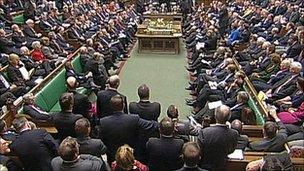MPs agree pay freeze to block 1% pay rise next year
- Published

MPs were criticised for accepting a 1.5% pay rise last year after the expenses scandal
MPs have agreed to freeze their £65,738 salaries after being asked to do so by the government.
They backed a call to scrap a planned 1% pay rise.
The Leader of the House Sir George Young said MPs should either be in step with the country, or insulate themselves and risk public anger.
The decision angered some backbenchers - some argued they were underpaid and others said they should not vote on their own salary.
Many have also expressed dismay at curbs placed on their expenses in the wake of the scandal over abuses.
The move will bring MPs into line with the majority of public sector workers, who have had their pay frozen for the next two years.
The pay freeze came about because of the government's desire to scrap the 1% award made by the Senior Salaries Review Body (SSRB).
'Difficult decisions'
Awards by the SSRB have been implemented automatically since 2008.
Sir George told MPs the government had to take difficult decisions across the public sector, including imposing a two-year pay freeze for those earning over £21,000.
He added: "Colleagues must now decide whether their constituents would welcome Parliament exempting itself from this policy and thus insulating itself from decisions that are affecting households up and down the country.
"Or whether, as I believe they should be in step with what is being required of other public servants."
He said he believed "it is right for us as MPs to forgo the pay increase which the current formula would have produced".
The Leader of the House said the SSRB had "no discretion" over the pay rise it awarded as it was simply applying a formula based on other salaries in the public sector.
The problem had arisen because there was a lag compared to the decision in last year's Budget to freeze pay.
Hilary Benn, shadow leader of the House, also backed the call to block a pay rise.
"The public would find it very hard to understand if we got a pay rise when they are not getting a pay rise and that is why we will support the motion," he said.
Labour MP John Mann (Bassetlaw) said he was opposed to MPs having to vote on their own salaries.
He argued that the principle of MPs' salaries should be set by a body entirely independent of Parliament.
- Published20 January 2011
- Published14 July 2010